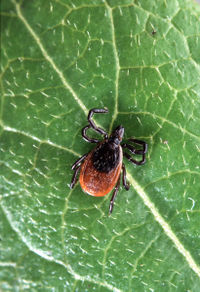Sex Makes You Fat
Shortly after the earth cooled, I was given a book with the arresting title of the Dieter’s Guide to Weight Loss During Sex.
I have no idea why. Nothing in the title seemed at all relevant to me.
So now I learn that sex makes you fat.
But only if you’re a female tick.

I would like to share with you that after mating, the weight of the female African ixodid tick balloons until she is 100 times her original size. That is truley astonishing.
This observation has lead a researcher from the Department of Biological Sciences at the University of Alberta to investigate what it is about copulation that triggers such a massive weight gain.
In a new paper published in the Journal of Insect Physiology, Dr. Reuben Kaufman suggests that there are several differences between the ixodid tick and other blood-sucking beasties – mosquitoes, tsetse flies, bedbugs and kissing bugs – that may help explain the weight gain. None of them has anything like this kind of weight gain: it seems to be unique to the female African tick.
Kaufman suggests that the ixodid tick displays a significant difference in lifestyle from the other insects and that it is adaptive for the virgin to remain small before mating: she wants to stay below the host’s radar.
This species of tick remains on the host for a number of days, rather than minutes. As Kaufman says,
“In this family of ticks, mating takes place on the host. Most other insects mate before or after their brief blood meal – the two acts are totally separate, but not with these ticks.”
Female ticks require six to 10 days to engorge fully. First, she attaches herself to the skin. Then she feeds to 10 times her unfed weight and finally, after copulation, she increases her weight a further tenfold.
On the other hand, the virgin tick rarely exceeds the critical weight necessary for laying eggs. She will hang on to the host for weeks waiting for a male to find her. If the virgin gains too much weight and is groomed off the host, she will not be able to reattach herself to another host and continue feeding. If she remains small she still has a chance to reattach itself to another host, which hopefully will be infested with some feeding males. Then she cannot only continue feeding, but may also have the chance of meeting a mate.
As Kaufman says,
“If a male eventually copulates with her, she will engorge normally and then be able to lay eggs. This is one reason why it might be adaptive for the virgin to remain small until mated.”
In terms of what causes the female to become so engorged, it seems to have something to do with the exchange of bodily fluids. The male fluids contain two engorgement factor proteins that together act as a signal to tell her to complete engorgement.
This work may sound as if it is a bit out of left field, but it is actually very important. Ticks can be a real problem in many parts of the world: even in Georgia, it is a daily ritual to check the dog, cats and horses for ticks.
This work is part of a research program to produce an anti-tick vaccine. Some experiments have already suggested that normal, mated ticks are unable to fully engorge when feeding on a host that has been immunized against the engorgement factor proteins. If these observations can be confirmed and extended, an effective anti-tick vaccine to protect livestock and pets could be on the horizon.







Nice post! You have said it very well. Keep going.
Dear Kim,
Thank you for commenting!
You made me :-))
Kind regards,
RP